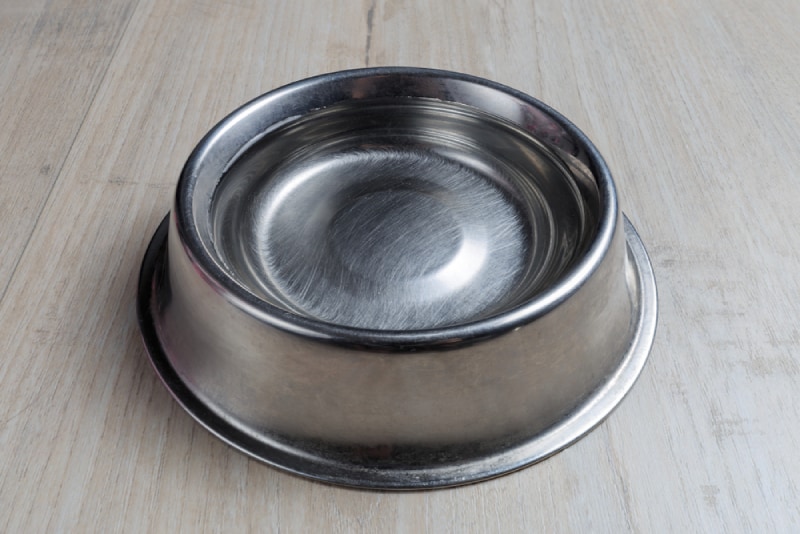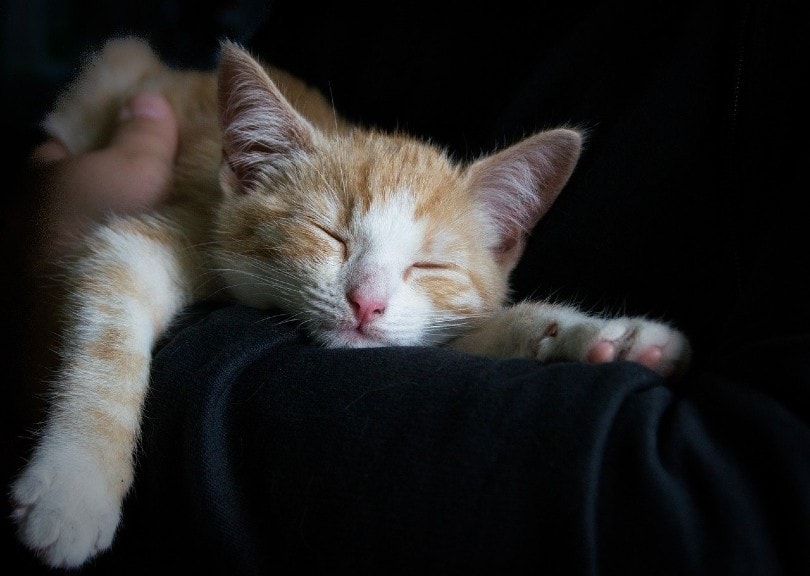Do Cats Need Baths? Reasons, Facts & Tips

Updated on
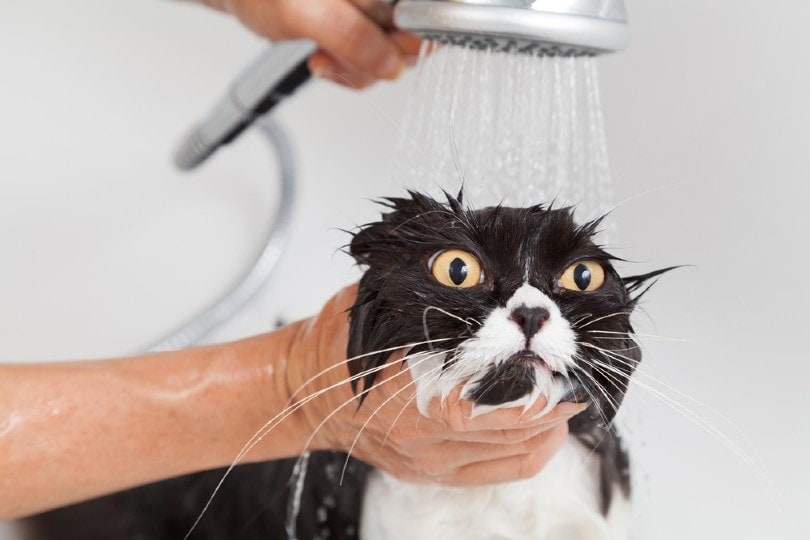
The thought of cats brings to mind sprinting in the woods, hiding in the alley, or appearing when you least expect it. These prowling, independent, nighttime-loving creatures have an affinity for being by the warmth of the fire—but what about being near water?
Water is not something we associate with our feline friends. However, some cat breeds adore it. The Maine Coon, the Turkish Van, and the Bengal cat are some cats that are known to like a little dip. If you are looking for a kitty companion to take to the seaside, then certainly read on.
All cats are different with individual personalities so do not expect your Ms. Fluffy to become an Olympic swimmer just because they are an American Bobtail. The good news is that your cat’s fear—or so-called fear—of water may just be a myth. So, bathing a cat could be something they like, but whether they need one or not is a little more complex. As a guideline, cats don’t regularly need baths, but there are many exceptions.
Why do cats need baths?
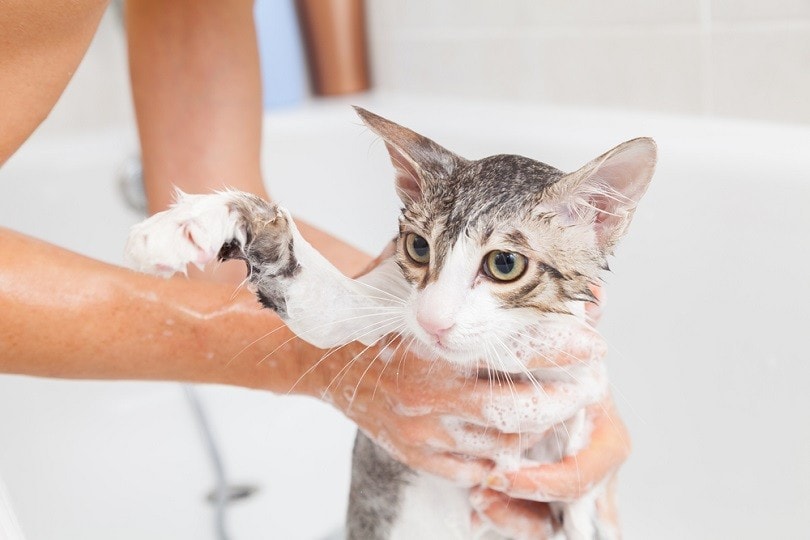
Usually, when your cat is meddling in the kitchen and you turn your water taps on, they run away as fast as they can. Naturally, this leads people to believe that felines do not like water. Plus, they groom themselves so much each day people tend to think they never need to be formally cleaned. Neither is completely true. To start with, most cats are painstakingly efficient at grooming themselves they may spend up to one-third of their day doing self-cleaning. The tongue of a cat is covered in tiny papillae-like bristles which spread saliva over their coat. This ensures your cats’ fur stays smooth and glossy.
The 3 main reasons for bathing your cat.
1. Medical Conditions
A more senior feline may be too feeble or overweight to properly groom themselves. In this instance, a frequent relaxing bath may just provide the care they need. Certain skin conditions cause itch and soreness that can be soothed with bathing in a medicated solution. Seborrhea is one such example and allergies to fleas may induce the same. As always consult a cat expert vet before washing.
2. Circumstantial
The most serious circumstance in which you should probably wash your pet is when they have managed to get something on their fur, such as gasoline, glue, or paint, which they could ingest. If they ingested such fumes, the outcome could be life-threatening so bathe immediately until the coat is completely clean. If you have an outdoor cat and they come home smelling of something nasty or with a sticky substance on their fur, that usually warrants a bath, as you would not want them to try licking an unknown and potentially toxic substance off with their tongue.
Remember, they are mini-lions and have an adventurous spirit. If the smell is unbearable, such as a skunk’s scent, then bathing is the best option for the whole household. A natural cat shampoo would be advisable in this situation but be sure to check first. Washing may also be completely required if your cat has an infestation of fleas, bugs, or lice. A special washing fluid is imperative in this situation so that you don’t find yourself in the same boat a couple of days later! It may be the best option to get a professional groomer or vet nurse to bathe your kitty in this case so you can rest assured that the job has been done.
Bathing your pet can be challenging, but the right shampoo will make it a lot easier! We have two favorite shampoos for the job, both are safe, all-natural shampoos designed with your pets in mind. Our soothing shampoos are pH balanced, made in the USA, and free of glutens, dyes, sulfates, and phthalates. Here’s a quick guide to help you choose the right option for your pet’s next bath!
Hepper Colloidal Oatmeal Pet Shampoo
Hepper Waterless No Rinse Pet Shampoo
Natural cucumber & aloe scent
Safe for cats & dogs
Rinsing required
Free of harsh chemicals & nasty ingredients
Lathers easily
3. Specific Breed
There are numerous breeds of cats that simply cannot go unbathed. Long-haired felines such as Persian cats certainly need a seasonal bath. Some short-haired cats, such as the Manx, have quite a lot of body oil, so rinsing up to once a week can help aid cleanliness. Bathing is also required for nearly all types of hairless cats as often as weekly, as their skin builds up oils and dirt without a layer of fur for protection.
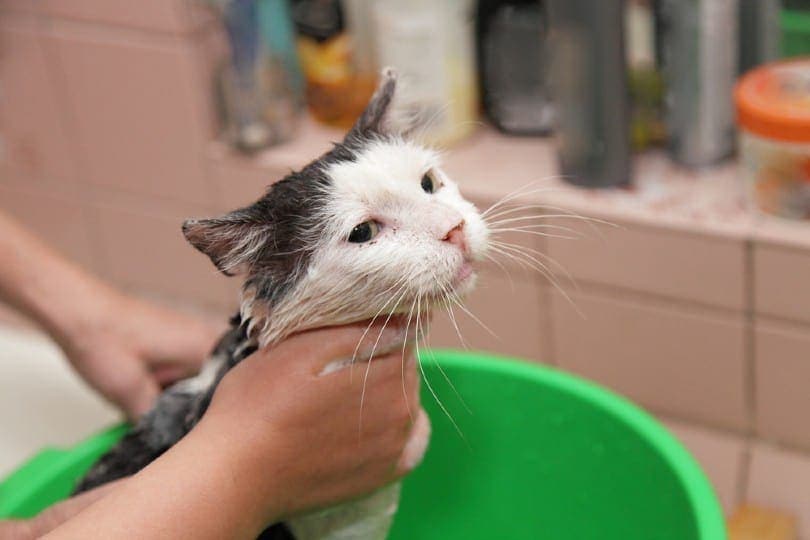
The 3 steps to bath your cat.
1. The preparation
Before the washing begins, give your kitty their favorite meal and have a little play and cuddle so that they can be calm and reassured nothing bad is going to happen to them. Have all the products you need nearby so that the timeframe can be as narrow as possible just in case your cat gets cold. Have cotton balls to clean his/her ears, your specific shampoo, lots of towels, and cat treats for emergency anxiety relief.
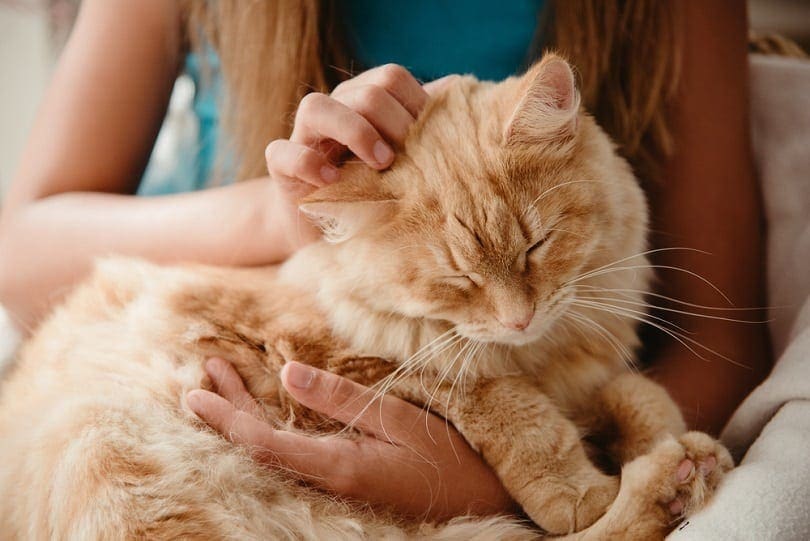
2. The bathing event
Ideally, you could have a baby bathtub on the floor in the bathroom, or a non-skid surface in case your kitty gets scared. Heat the water to a moderate temperature and check multiple times before you let your cat in the room. Begin with your feline’s head and ensure no soap gets into their eyes, mouth, and ears. Lather very gently all around and rinse thoroughly. If you can (and your cat has not escaped), towel dry for as long as it takes and place your cat in a warm place. This is particularly important if your kitty is older.
3. The post-bath care
If the bath was intended for medicinal purposes, check your pet, and see whether there was the desired improvement. Otherwise, have a careful look at your cat’s fur and a sniff to ensure they are squeaky clean. Ideally, you would keep your cat indoors until he/she has dried fully and relaxed but it is best to get a sense of what they need after bath time.
Do kittens need to be bathed?
Kittens who have their loving mom to take care of them do not require bathing as they will learn from her early on how to groom. An orphan kitten may need extra cleaning but again ask advice from your vet as it is situation-specific.
When do you not wash a cat?
If your cat is either very old, sick, or stressed, it’s best to not cause your pal any more anxiety. Bathing for medicinal reasons, as discussed with your vet, is of course a different case but as a rule, like us humans, if we’re sick then bed rest and good food are most important to ensure recovery.
See Also:
Featured Image Credit: 135pixels, Shutterstock




